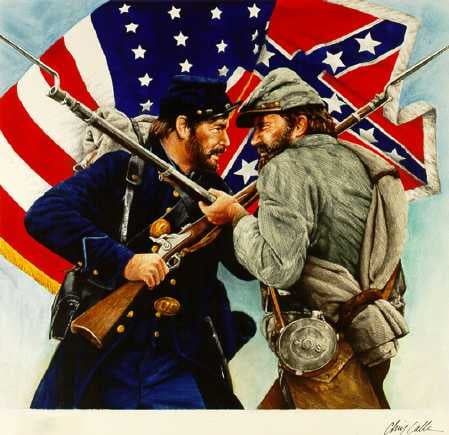The American Civil War Causes, Events, and Consequences Explained: Meaning, Importance & Applications
This lesson examines the American Civil War, one of the most defining events in U.S. history, exploring its root causes, key battles, and lasting consequences. You will gain insights into how deep divisions over slavery, states' rights, and economic differences sparked conflict between the North and South.
What Caused the American Civil War?Causes of the American Civil War
The Civil War began due to longstanding tensions over slavery, states' rights, and economic differences between the North and South. Southern states feared that the federal government would abolish slavery, which was central to their economy and social structure (Source: U.S. Civil War Archives).
Example: When Abraham Lincoln was elected President in 1860 without any Southern electoral votes, several Southern states seceded in protest, believing their way of life was under threat.
Quick Tip: The Civil War wasn't started by just one event-it was built over decades of division.
Union vs. Confederacy: Key Differences
The Union (North) and the Confederacy (South) had major differences in economy, politics, and values. The Union favored industrial development and a strong federal government, while the Confederacy prioritized agriculture, especially slave-based plantations, and believed states had the right to secede (Source: National Civil War Library).
Example: The Union had more railroads, factories, and a larger population, while the South relied heavily on enslaved labor to grow cash crops like cotton and tobacco.
Quick Tip: Think industry vs. agriculture when comparing the North and South.
Take This Quiz:
Abraham Lincoln and the Emancipation Proclamation
President Abraham Lincoln issued the Emancipation Proclamation in 1863, declaring that enslaved people in Confederate states were free. Though it didn't immediately free all enslaved people, it changed the purpose of the war to include ending slavery (Source: Presidential Archives).
Example: The Proclamation encouraged many African Americans to join the Union Army, fighting for both freedom and country.
Quick Tip: The Emancipation Proclamation didn't end slavery everywhere-it only applied to states in rebellion.
Major Battles: Gettysburg and Antietam
Two critical battles in the Civil War were Antietam (1862) and Gettysburg (1863). Antietam was the bloodiest single-day battle, while Gettysburg was the turning point, stopping General Lee's invasion of the North (Source: U.S. Military Records).
Example: At Gettysburg, Union forces held the high ground and repelled Lee's attacks, leading to over 50,000 casualties in three days.
Quick Tip: Gettysburg = turning point; Antietam = bloodiest day.
Role of African Americans in the Civil War
African Americans, both free and formerly enslaved, played a critical role in the Civil War. Over 180,000 served in the Union Army and Navy, often in segregated units like the 54th Massachusetts Infantry (Source: U.S. Colored Troops Records).
Example: The 54th Massachusetts famously led an assault on Fort Wagner, displaying immense courage despite discrimination and poor equipment.
Quick Tip: Black soldiers faced racism but still fought with honor and determination.
Lincoln's Gettysburg Address
Delivered in 1863 after the Battle of Gettysburg, Lincoln's speech honored fallen soldiers and redefined the Civil War as a struggle for national unity and human equality (Source: National Archives of Speeches).
Example: Lincoln said, "Government of the people, by the people, for the people shall not perish from the Earth."
Quick Tip: The Gettysburg Address was short but powerful-only 272 words.
Surrender at Appomattox Court House
The Civil War effectively ended on April 9, 1865, when Confederate General Robert E. Lee surrendered to Union General Ulysses S. Grant at Appomattox Court House in Virginia (Source: War End Records).
Example: Grant offered generous terms of surrender to promote national healing, allowing Confederate soldiers to return home peacefully.
Quick Tip: Lee's surrender didn't end all fighting instantly, but it was the symbolic end of the war.
Assassination of Abraham Lincoln
Just five days after the surrender, President Abraham Lincoln was assassinated on April 14, 1865, by John Wilkes Booth, a Confederate sympathizer, at Ford's Theatre (Source: Presidential Assassination Records).
Example: Booth believed he was avenging the South, but Lincoln's death shocked the nation and deepened tensions during Reconstruction.
Quick Tip: Lincoln didn't live to guide the peace he hoped to achieve.
Take This Quiz:
They sparked changes in art, science, religion, and society.
Rate this lesson:
 Back to top
Back to top

